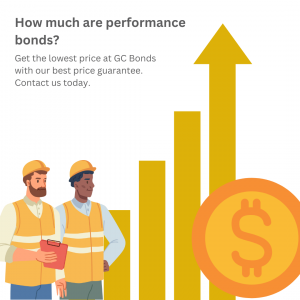How Much Are Performance Bonds?
If you’re thinking about purchasing performance bonds, there are several cost aspects that you need to know about. This article will help you to understand how the costs are made up, and other factors that may affect the price to contractors.
While there is a standard percentage of a contract cost for performance bonds, which is typically 10% of the contract value, this isn’t necessarily what you will pay as the contractor. Contractors pay a premium based on their financial strength, which can also be determined by the beneficiaries and underwriters.
How Are Performance Bond Costs Calculated?
There are various factors that can determine the cost of performance bonds. Examples of factors that can affect this include:
- The financial strength of the contractor and their principal – Ways in which to influence this can include providing additional related companies in the form of cross-company guarantees and/or personal guarantees
- Nature of bond wording – There are a different types of bond wording that can be utilised, these include both conditional and on-demand wording.
- Bond value – the size of the bond will influence the cost of the bond. A potential way in which to reduce bond fees in relation to the level of bonding being required can include negotiating reductions with the employer. Require our support in relation to this? Speak to a client account manager today!
- Economic market conditions – recent high-profile contractor insolvencies and hardened surety market conditions resulting in increased bond fees.
- Length of bond duration – bonds that are required for a long period of time, especially during uncertain and volatile economic conditions can reduce surety market appetite, therefore influencing bond fees.
- Site particulars – the nature of the scheme and the associated technical considerations.

What Percentage of the Contract Sum Are Performance Bonds Typically Based On?
The typical percentage of the contract sum that performance bonds are based on is 10%. This is an industry standard and it is used throughout most contracts. So for example, if a contract is worth £1 million, then the performance bond would be £100,000.
However, although it is most commonly 10% this can also vary to 5% depending on the employer.
How to Reduce Bond Fees
There are a number of different ways to reduce the cost of a performance bond. These include, but are not limited, to the following:
- Additional cross-company guarantees
- Personal guarantees
- Negotiating with the employer to reduce the bond value
- Providing all associated requested information associated with the scheme
- Filing financial accounts early/on time
CG Bonds will assist and advise all contractors to provide the necessary information, which we will compile, consolidate and present to the surety markets. However, this may not always be the case with other companies that help to provide performance bonds, so make sure to check with them.
Conclusion- Understanding the Costs Involved With Performance Bonds
To summarise, the cost of a performance bond can vary as detailed in this article. However, at CG Bonds we hold an extensive panel of underwriting partnerships with world-leading insurers and also have exclusive relationships which are not accessible to all brokers. As such, we can guarantee to secure the best value performance bonds in the market.
To learn more about our best price guarantee, get in touch.
Get in touch today for friendly, helpful advice on purchasing your performance bonds.












